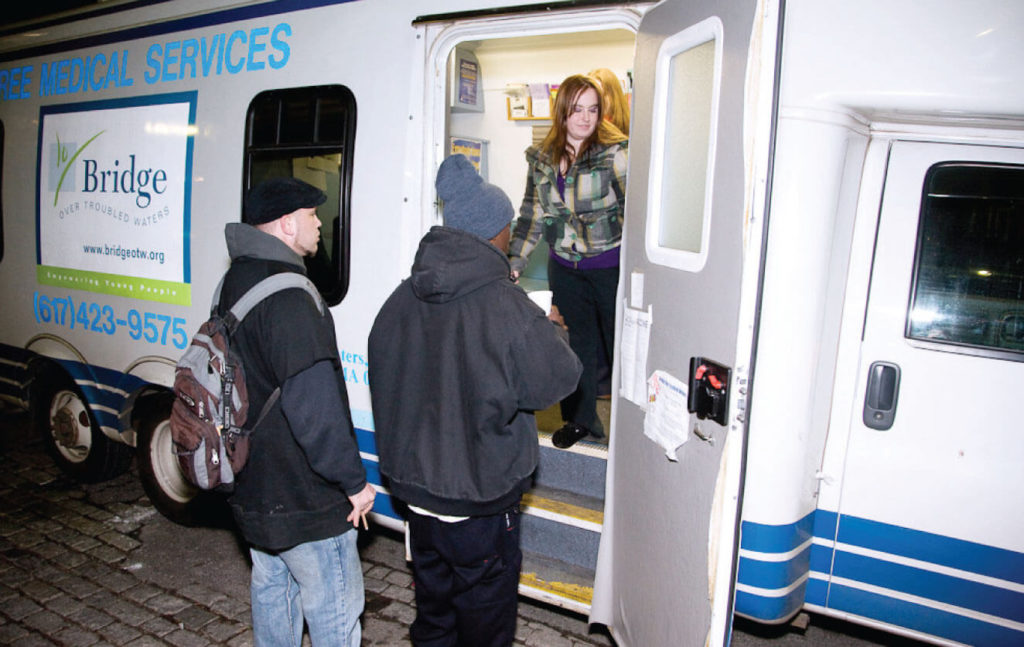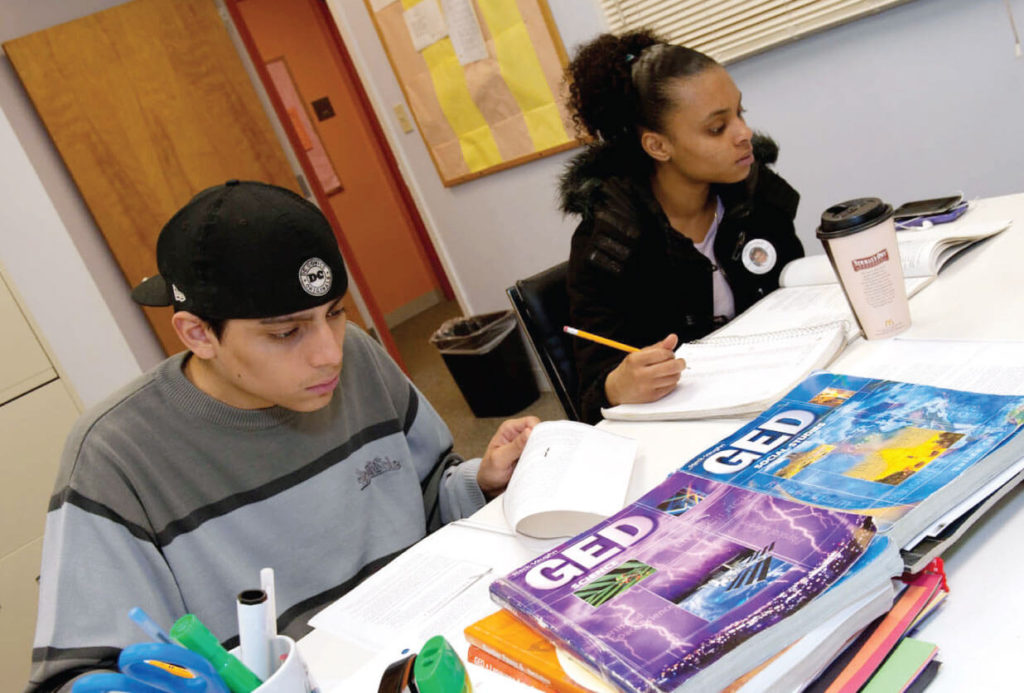by: Jane Mack

Bridge Over Troubled Waters reaches out to homeless and runaway teens. Its offices overlook Boston Common, the park in the heart of downtown Boston.
Across the street, shoppers and workers stream in and out of the Park Street entry to the subway — the T. Kindergarten kids on a field trip plant tulip bulbs in a flowerbed. Old people sit on benches feeding pigeons. Musicians play near the tourist information stand.
Invisible to tourists but present to Bridge streetworkers are the runaway and homeless teens who haunt the Common and other centers in the city. In 2009, 2,400 of these kids used Bridge counseling and medical services, GED and work development classes, and transitional housing.
Barbara Whelan, CSJ, was among the ten people who started Bridge nearly 40 years ago. An 8th-grade teacher then, she saw her students on drugs and wanted to do more. Five of the core group were Sisters of St. Joseph. Sister Barbara is still a Bridge board member today.
In 1970, when the five went to the streets to find what kids needed, the sisters of their community took turns making sandwiches to take along. Today a Bridge volunteer — “Sandwich Lady” Charlotte — makes the sandwiches that the Bridge medical van distributes at Park Street, Copley Square, and Harvard Square every weekday evening. Volunteer medical staff ride the van and offer basic first aid, referrals, and health advice. From the beginning Bridge workers have hung out with kids on their own turf.
Robb Zarges, Executive Director of Bridge Over Troubled Waters, is a tall man with a gentle presence and open manner. From his tiny office he talks about what motivates him to do this work.
“This is not a religious organization but for me it is a matter of living out my faith on a day-to-day basis,” Robb says. “Jesus talks about the poor all the time, about ministry to those on the fringe. Jesus transcends the political — he is about people and social justice for people.
“If Jesus were alive today, he probably would be here with Bridge kids or at other places where the people in need are,” Robb continues. “Jesus believed people could make a difference in each other’s lives. That is what we try to do here.”
“We want kids to understand that they have power over their lives,” Robb says. “We believe that anyone who walks in through this door has everything inside of them that they need to be successful in life.”
Kalvin, 18
I had a little trouble my freshman year of high school. I goofed off, never did my work, got thrown out of class, never went to class. I regret it because it set me back. Sophomore year I had to take both freshman and sophomore classes.
I began to have problems at home with my father. I was stubborn and independent and wanted to do things my way with no help from anyone. My father thought the only way to do anything was his way. And I would not do it.
I joined the football team, which actually ended up affecting me negatively. The practice field was over an hour walk away from my house. Practice didn’t end until seven. I got home tired, not wanting to eat. I went to sleep without doing homework. The next day I couldn’t stay awake in class and that led to more problems, particularly between me and my father, because I wasn’t doing what I had to in school.
That summer my father and I had a bunch of arguments. He almost kicked me out, so I took it upon myself to leave. I stayed with my friends or my uncle for a while. I now live with my father’s mother and have for about two years off and on. She got irritated with me because I was getting into some stuff like marijuana and hanging out with gang members.
Last year I tried to go back to high school in February. But I had been out of school for three months. It was hard to get back into the habit of schoolwork, and I thought there was no point because I was so far behind.
This year I just couldn’t do it. I went to my guidance counselor and she mentioned Bridge and their GED program. So I came and had my intake interview and started the program.
I really like the Bridge GED program. It’s like a library. I can do my work where it’s quiet; the teachers are attentive and open to working one-on-one. I’m hoping to pass my GED test this June.
“In the end, a lot of distance stands between where the kids were on their path when we met them and where they are now,” Robb continues. “Their lives are different. That’s how we measure success. Malcolm gets up every day and spends his whole day here. That is success for him, walking through that door the second time after leaving the first.”
Malcolm, 20
Malcolm was sent to juvenile detention after his junior year of high school and has been at Bridge for about 10 months.
When I was young, I was abused by several members of my family…to the point that I thought abuse was normal. It really messed up my mind.
When I got out of prison, a friend told me about the Bridge. I didn’t even understand what it was. One day I was walking up West Street and saw the sign on the door…Bridge Over Troubled Waters. Then I got it. It was a place that would help me straighten myself out.
So I went in a week later and did an intake interview. The people were really nice and I wanted to stay. But another voice was telling me to go away and not disappoint these people, because I knew deep down inside I didn’t want to get help yet.
On my first time here Bridge helped me with a lot of stuff — like interview clothing. They sent me to interviews and job fairs. For a while I thought that was enough, that I could just take this help and travel on my journey by myself.
So I left, and I had up and down days. I realize now that I should have stayed because I only knew myself a little bit. I left only to be caught, stuck in a jam, in a corner with no reliable resources. I was set back.
I came back and haven’t left since. This is a home away from home. I don’t live here but I wish I could; I still have to go back to the shelter every night.
I am trying to get over the hump now into some sort of in-between place where I will be satisfied and have a career. I’m trying to change; I’m learning to change. I don’t do the stuff I used to. I’m going to keep on pushing myself, finding the enjoyment in my own life. But sometimes I get lost; I get stuck…
If I weren’t here at Bridge, my life would be a disaster. I’d be incarcerated for the rest of my life or dead. I feel good when I’m here, even though I have my ups and downs. When I come into this building, it’s like everything else just vanishes for the time being, until I get back outside, back to the shelter.


